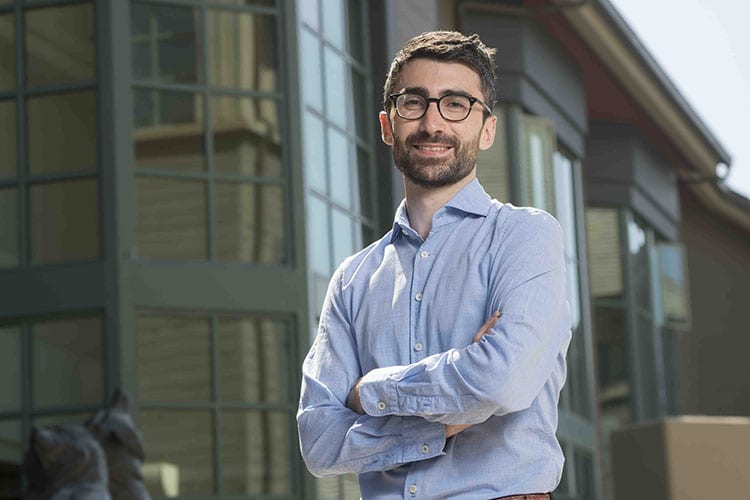
Cities are a source of fascination for new Berkeley Haas Asst. Prof. Nick Tsivanidis, and an endless source of data: He’s used satellite images and machine learning to study how Indian slums have changed over time, and cell phone data to look at Syrian refugees’ migration to Amman, Jordan—where they’ve doubled the size of the capitol from 2 million to 4 million.
“By 2050, it’s projected that about 2.5 billion more people will move into cities, mostly in Africa and East Asia,” Tsivanidis says. “There’s a huge opportunity there to get the backbones of these cities right, to get the benefits of urbanization and avoid the demons of density.”
Tsivanidis is the newest member of the Berkeley Haas faculty, joining the Real Estate Group with a joint appointment in the Department of Economics. His focus is using granular data and natural experiments to understand and potentially shape how cities develop. He’ll begin teaching macroeconomics in the MBA program in the spring.
“We’re thrilled to welcome Nick to our real estate faculty,” says Prof. Catherine Wolfram, associate dean for academic affairs and chair of the faculty. “He’s pushing the frontier to deepen our understanding of urbanization in developing economies. These are super important issues, given just how fast these cities are predicted to grow.”
Interest in developing economies
Tsivanidis, who grew up in London, first got interested in development when he taught English at a primary school in Tanzania during a gap year between high school and college. He returned home to study philosophy, politics, and economics at Warwick University as an undergraduate, before heading to Yale University for a master’s in international and development economics.
He got more on-the-ground experience during a year in Rwanda studying the spread of technology among coffee farmers. He then moved to Chicago, spending another year as a researcher before beginning his PhD at the University of Chicago, where he switched his focus to urban economics.
“Having grown up in a city, and seeing the differences between cities and the countryside, it’s clear that cities are the future lands-of-opportunity for these countries,” he says. “That’s what urban economics is all about: Can we measure and understand the benefits of population concentration in cities? How does this trade off with the downsides of density? And how can economic policy help us maximize those benefits and minimize the costs?
For his doctoral thesis, Tsivanidis looked at innovative ways that cities can improve their commuting infrastructure, studying the world’s largest bus rapid transit system in Bogotá, Colombia. Bus rapid transit systems are far cheaper and faster to build than subway systems, and nearly as fast. He analyzed multiple data sources to look at the combined benefits of Bogotá’s system, from more leisure time for commuters to higher land prices along the transit route.
Most recently, Tsivanidis spent a postdoctoral year at Dartmouth College. He also serves as co-director of the Cities Research Programme in the International Growth Centre at the London School of Economics.
Tsivanidis says he was drawn to Berkeley for the strength of its real estate group, its focus on urban economics and energy economics, and the opportunity to collaborate with exceptional researchers in economics, agricultural economics, the School of Information, and across campus.
He’s also looking forward to exploring the Bay Area’s natural beauty with his wife and one-year-old. “We loved Chicago, but it was very flat, so we’re looking forward to doing a lot of hiking.”